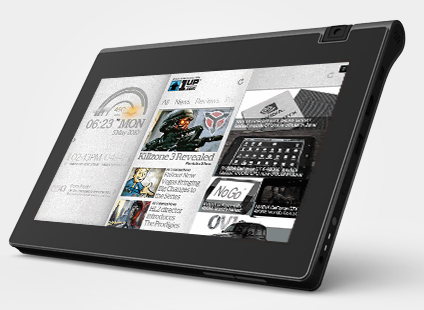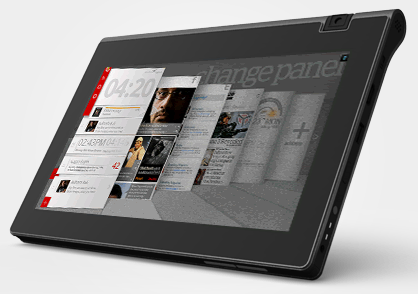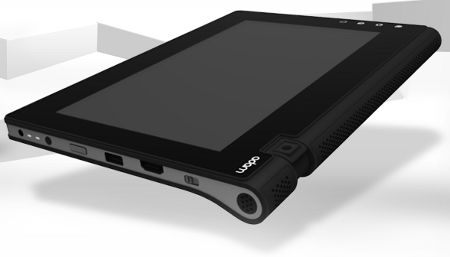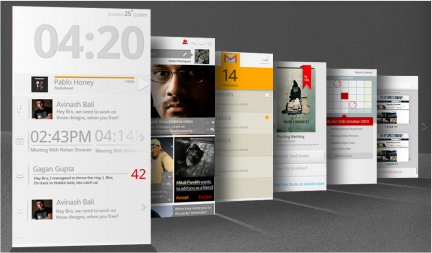Pixel Qi-enabled Android tablet open for pre-orders
Dec 10, 2010 — by Eric Brown — from the LinuxDevices Archive — 2 viewsNotion Ink is taking pre-orders for its 10.1-inch, WSVGA “Adam” Android tablet, with prices ranging from $375 for the LCD/Wi-Fi version to $550 with 3G and a Pixel Qi transflective display. The Adam is built on an Nvidia Tegra 2 processor, offers GPS, Bluetooth, and a 3.2-megapixel swivel camera, and features a tablet-optimized version of Android called “Eden.”
India-based Notion Ink wowed the Android world last January when it showed off its 10.1-inch Adam tablet at the Consumer Electronics Show (CES) in Las Vegas. The Adam prototype was notable not only for its dual-core, Cortex-A9 Nvidia Tegra 250 (Tegra 2) system-on-chip (SoC), but also for its Pixel Qi dual-mode display — which enables users to switch from full-color mode to a low-power, monochrome ePaper mode with the push of a button. (See farther below for background.)

Notion Ink's Adam
Meanwhile, several other Android tablets have since shipped with the Tegra 2. Yet no tablets, as far we know, have shipped with the Pixel Qi display, so the Adam may still end up being the first in that category.

Adam showing Eden UI's panel interface
Pricing for the tablet seems reasonable considering the Tegra 2 processor, 10.1-inch, WSVGA touchscreen, and full slate of wireless features, at least for the special pre-order prices available now.
The Wi-Fi-only version sells for approximately $375, while a model that adds 3G boosts that to approximately $425. The Pixel Qi transflective display version with Wi-Fi only starts at about $500, while adding 3G brings it up to $550, says Notion Ink.
For the first time, Notion Ink has posted full specs for the Adam — except, that is, for a "mystery feature" (which the company does allow is not an NFC reader — that may come in a later version).
Notion Ink does not list the clock rate of the Tegra 2, but its dual Cortex-A9 cores are typically clocked to 1GHz. The SoC is joined with 1GB DDR2 RAM, 1GB internal flash, and a microSD slot pre-installed with an 8GB card, says the company. The tablet ships with a full gamut of wireless features including, Wi-Fi, Bluetooth, and GPS, although as noted, the 3G radio adds $50 to the price.

Adam render with some port detail
An HDMI port is also supplied, delivering 1080p output, says the company. Other features are said to include several USB ports, audio I/O, as well as an accelerometer, light sensor, and a digital compass.
Specifications listed for the Adam include:
- Processor — Nvidia Tegra 250
- Memory:
- 1GB DDR2 RAM
- 1GB internal SLC flash
- 8GB flash card
- MicroSD slot
- Display — 10.1.inch 1024 x 600 LCD (or optional Pixel Qi transflective) multitouch display; matte finish; anti-glare; scratch/fingerprint resistant
- Wireless:
- 802.11b/g/n
- Bluetooth 2.1 + EDR
- GPS
- 3G HSPA (optional)
- SIM Card slot
- I/O:
- 2 x USB 2.0 Host
- Mini-USB
- HDMI
- Audio — 3.5mm headphone jack; mic; stereo speakers
- Camera — 3.2-megapixel auto-focus, 185-deg. swivel
- Other features — 3-axis accelerometer; ambient light sensor; digital compass; six color choices
- Battery — 3-cell, 24.6 Whr battery
- Weight– 1.6 pounds
- Dimensions — 10.6 x 7.5 x 0.55 inches (269 x 191 x 14mm)
Pixel Qi background
The optional Pixel Qi (pronounced "Pixel Chee") transflective technology aims to combine the power-savings of a monochrome screen. such as the E Ink displays found in most e-readers. with the color and multimedia capabilities of standard LCD screens.
The Pixel Qi technology allows a portable computer's screen to be switched from a standard, backlit color mode to a reflective mode, saving power and allowing the device to be used even in direct, strong sunlight. The monochrome mode is said to use up to 80 percent less power than an ordinary display.
After many delays, Pixel Qi began shipping its 10.1-inch screen in July, and announced in September that a seven-inch version would ship by year's end.
Eden: A big-screen Android with a panel UI
Like many Android tablet vendors, Notion Ink has chosen to add extensions to Android 2.2 to make up for Froyo's lack of support for larger screen resolutions. Yet Notion Ink's ambitious "Eden" version of Android may be more than just a place-holder waiting for Android 3.0 ("Honeycomb") to resolve the issue next year.
Notion Ink's blog is somewhat vague about what version of Android the shipping Eden will be based on, but it appears as if it could still be the current Android 2.2 instead of the recently released Android 2.3 ("Gingerbread"). There is no word yet as if it will support Android Market access, although few tablets yet do.

Eden's panel UI
For example, Eden features an allegedly Honeycomb-like panel interface (above). The panel system allows for "hundreds of panel instances, which are views within views," says Notion Ink. These are further defined as "independent windows on-screen." In addition, memory management is also said to mirror similar improvements expected in Honeycomb.

Eden's multitouch virtual keyboard